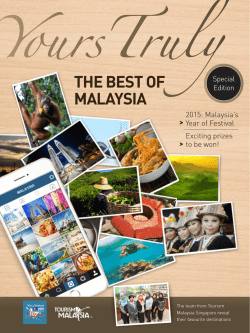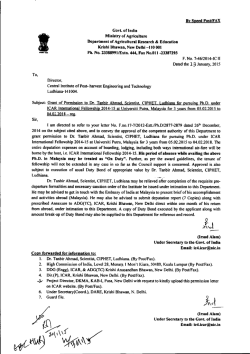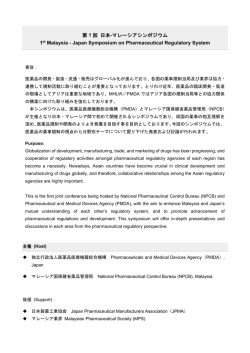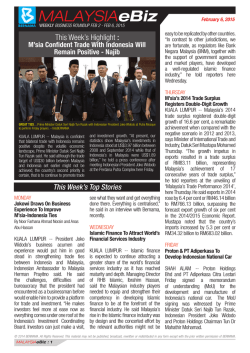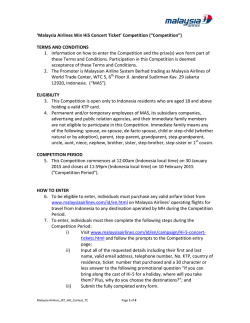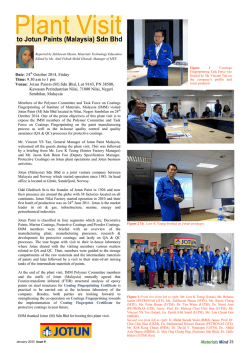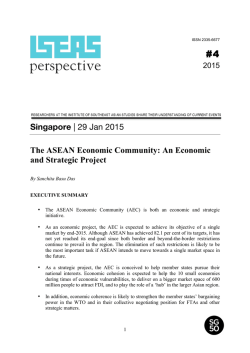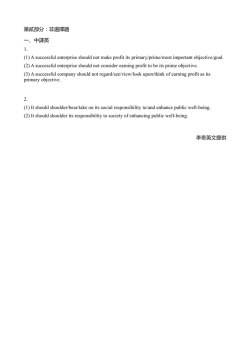
A Pivotal Year for Malaysia on the Global Stage
A Pivotal Year for Malaysia on the Global Stage By Brian Harding and Trevor Sutton January 29, 2015 Last month, President Barack Obama engaged in an unexpected exercise in bilateral relationship building when Malaysian Prime Minister Najib Razak joined him for a round of golf at Kaneohe Bay, Hawaii. The outing came on the heels of President Obama’s trip to Malaysia last April, making him the first sitting American president to visit the country since Lyndon B. Johnson in 1966.1 As it assumes the chairmanship of the Association of Southeast Asian Nations, or ASEAN, Malaysia will have an outsized regional presence throughout 2015 and become a focus of the United States’ engagement in Asia. While all ASEAN chairs host a raft of meetings and work incrementally to deepen ties among the members, 2015 is a watershed year for ASEAN: The 10 ASEAN nations have committed to transforming into one “ASEAN Community” with three pillars—cohesive action on political and security affairs, deeper economic integration, and greater sociocultural cooperation—by December 31, 2015.2 As chair, it falls to Malaysia to make this vision of an integrated ASEAN Community a reality. Furthermore, Malaysia takes up a two-year, nonpermanent seat on the U.N. Security Council this year. This role, together with the ASEAN chairmanship, may make 2015 one of the most important years for Malaysia’s international engagement since it achieved its independence from the United Kingdom in 1957. Malaysia’s increased international prominence has major implications for U.S.-Malaysia relations. The recent meetings between President Obama and Prime Minister Najib reflect a significant warming in U.S.-Malaysia relations, especially compared with the oftenacrimonious relations during the tenure of Najib’s predecessor, Mahathir Mohamad.3 In addition to the camaraderie between the two leaders, institutional ties between the United States and the Malaysian government—such as the establishment of regular policy dialogues and high-level visits—have dramatically increased during the Obama administration. This steady, forward-looking diplomacy provides the United States with a foundation of trust as it seeks to influence how Malaysia handles key issues in 2015, including economic integration and tensions in the South China Sea. 1 Center for American Progress | A Pivotal Year for Malaysia on the Global Stage Outside of East Asia, maintaining positive relations with a country that prides itself on being a Muslim-majority nation that cherishes moderation may also pay dividends.4 In particular, Malaysian support at the United Nations for U.S. efforts to contain terrorism and instability in the Middle East and Africa could enhance the legitimacy of those policies in the Muslim world and among the broader international community. Such support is far from guaranteed, but the presence of a strong, bilateral U.S.-Malaysia relationship makes it more likely. Although incentives for U.S.-Malaysia cooperation are arguably stronger now than at any time during the post-Cold War era, constraints remain on the relationship, most of them emanating from Malaysian domestic politics.5 In order to engage effectively with Prime Minister Najib and members of his ruling United Malays National Organization, or UMNO, U.S. policymakers must be sensitive to Malaysia’s domestic concerns and respectful of its reluctance to affiliate itself too strongly with any one major power. At the same time, the United States must remain true to its values and not ignore UMNO’s proclivity to trample on individual freedoms at home for political gain—something that is likely to be another source of tension moving forward.6 As Malaysia assumes a greater role on the world stage in 2015, this issue brief sets out the key dimensions of Malaysia’s foreign policy and the structural factors that drive it. Domestic politics A multicultural, Muslim-majority nation of 30 million people located in strategically important territory along the Strait of Malacca and the island of Borneo, Malaysia has emerged in the past 25 years as one of the fastest-growing economies in East Asia and as a significant trading partner of Japan, China, and the United States. Since gaining its independence from Britain, Malaysia has been ruled by the United Malays National Organization, which leads a coalition of parties called Barisan Nasional, or BN. UMNO’s dominance of Malaysian politics can be largely attributed to economic policies that have aimed, with some success, to reduce inequality between ethnic Malays—who make up approximately 60 percent of the population—and the wealthier Chinese and Indian populations, who comprise 25 percent and 7 percent of the population, respectively. Elections in Malaysia are generally fair and transparent, and they have become increasingly competitive over the past decade.7 In 2013, the BN managed to retain its parliamentary majority despite losing the popular vote.8 The opposition Pakatan Rakyat, or PK, coalition, is led by former Deputy Prime Minister Anwar Ibrahim. Malaysia has made great progress since Ibrahim was arrested by former Prime Minister Mahathir’s 2 Center for American Progress | A Pivotal Year for Malaysia on the Global Stage administration and convicted on trumped-up charges of graft and sodomy, which is technically still illegal in Malaysia.9 The PK is comprised of a wobbly alliance of Anwar’s multiracial, urban-dominated party; a secular Chinese-majority party; and a conservative Islamic party. Malaysia has seen phenomenal economic growth over the past quarter century. UNMO’s ability to retain its primacy in Malaysia politics will likely turn on voter confidence that the coalition will continue to deliver on its promises of prosperity and, in particular, deliver for ethnic Malays. To this end, Prime Minister Najib’s top policy priority is making good on his “Vision 2020” pledge, which promised to raise the per-capita annual income from $10,500 to $15,000 by the end of the decade.10 This overriding concern routinely reveals itself in Malaysian foreign policy, including in its approach to China, with which it disputes territory in the South China Sea but also enjoys a valuable trade surplus.11 Although economic policy remains the dominant force in Malaysian politics, voters are not entirely indifferent to foreign affairs, especially as they relate to trade or to Western intervention in the affairs of Muslim nations. Overwhelming public disapproval of the Iraq war, for example, placed a significant strain on U.S.-Malaysia relations. Foreign policy Compared with many of its neighbors, Malaysia’s foreign policy over the past half century has been stable, peaceable, and cooperative despite occasionally sharp rhetoric. In the years following its independence, Malaysia adopted an expressly anti-Communist, pro-Western foreign policy; however, over the course of the late 1960s and 1970s, this posture shifted to a cautious neutralism. In a move that continues to underpin a bilateral relationship with Beijing that many have called “special,”12 Malaysia was the first country in the Association of Southeast Asian Nations to establish diplomatic relations with the People’s Republic of China. The historic 1974 visit of Prime Minister Tun Razak—the father of current Prime Minister Najib—to Beijing hastened the development of this relationship. During the last quarter of the 20th century, Malaysia embraced a more provocative role on the world stage that often incorporated anti-Western posturing. Through the 1980s and 1990s, Malaysia became a prominent advocate of South-South engagement among developing nations and sought to establish a leading position in the Muslim world. During this same period, leaders in Putrajaya—Malaysia’s administrative capital— aggressively courted stronger economic ties with Japan and, starting in the mid-1990s, with China.13 3 Center for American Progress | A Pivotal Year for Malaysia on the Global Stage Malaysia’s top leaders at the time, specifically then-Prime Minister Mahathir, also sought to diversify Malaysia’s international relations in order to avoid dependence on any single alliance or patron. In a balancing act, Malaysia—under Mahathir’s leadership—quietly nurtured defense relations with Washington and never opposed a U.S. military presence in East Asia, even as the prime minister leveled scathing criticisms at the United States and other Western powers.14 Current outlook Throughout Malaysia’s transitions in power and leadership, its foreign policy objectives have endured. Since coming to power, Prime Minister Najib has sought to sustain and expand trade relations with key partners—above all, China—while maintaining security cooperation with the United States. He also has advocated for a regional approach to resolving longstanding disputes in the South China Sea and for prioritizing Malaysia’s role as a middle power within ASEAN. Prime Minister Najib’s foreign policy, with its focus on economic objectives at the expense of grand strategy—as well as the degree to which it is driven by domestic political concerns rather than international prestige—represents a break from the Mahathir administration. As one scholar observed, “Najib’s comparably weak position within his own party … has required him to engage in constant domestic political bargaining to secure support, leaving less room and resources for a high profile and pro-active foreign policy.”15 Consistent with these priorities, much of the prime minister’s diplomacy has been in the service of advancing his signature Vision 2020 initiative at a time when his political coalition is weaker than ever.16 Malaysia has enthusiastically embraced the Trans-Pacific Partnership, with its promise of greater access to U.S. markets, while also aggressively courting Beijing, which became Malaysia’s largest trading partner in 2009 and is its largest source of foreign direct investment.17 China looms large in Malaysia’s economic planning: Prime Minister Najib has recently taken to trumpeting Malaysia’s historical and demographic ties to China while pursuing the heady objective of tripling trade levels by 2017.18 These circumstances dispose the Najib administration toward conciliatory diplomacy, as evidenced by revived U.S.-Malaysia engagement, improved relations with Indonesia and Australia, and the resolution of a small but acrimonious territorial dispute with Singapore.19 However, Putrajaya’s desire to mend fences and avoid conflict with neighbors and major trading partners risks lapsing into a de facto neutrality on contentious issues, such as territorial disputes in the South China Sea.20 An ASEAN chair that shirks constructive leadership on difficult issues rather than helping resolve tensions will undermine the organization’s relevance as it seeks to remain at the center of Asia’s regional security architecture. 4 Center for American Progress | A Pivotal Year for Malaysia on the Global Stage Malaysia and ASEAN Over the past four decades, Malaysia has consistently advocated for enhanced regionalism as a buffer against major power rivalries. It did so as a founding member of ASEAN in 1967 and as a supporter of ASEAN-centric institutions with broader membership, such as the annual ASEAN Regional Forum. Notwithstanding a robust commitment to the idea of ASEAN, Malaysia’s contributions to the substantive agenda of the organization have been minimal.21 Putrajaya has not been the first mover on any of ASEAN’s policy achievements over the past 25 years. For example, Singapore led the implementation of tariff reductions, as stipulated in the ASEAN Free Trade Area agreement in 1992.22 Nor can Malaysia claim credit for ASEAN’s efforts to revisit its noninterference policy in the 1990s, which were spearheaded by Thailand.23 Yet Malaysia’s assumption of the ASEAN chairmanship this year arrives at a critical moment for the organization, given its year-end deadline to establish the ASEAN Economic Community, or AEC, a pillar of the overall ASEAN community designed to begin to integrate the region’s 10 national economies into a single bloc. There is widespread skepticism that the region will be substantially more cohesive at the end of 2015 than it is now, putting Malaysia in the unenviable position of managing expectations without damaging ASEAN’s credibility. In describing its goals for its chairmanship, Malaysia unsurprisingly has focused on the AEC while gesturing vaguely in the direction of “community building.”24 It has also articulated a broadly worded desire to enhance relations with non-ASEAN participants in the various ASEAN fora.25 These platitudes gloss over what could prove to be Malaysia’s greatest challenge in leading ASEAN during 2015: the possibility of recurring hostilities in the South China Sea. While Malaysia—along with China, Vietnam, the Philippines, and Brunei—is a claimant to territory in the South China Sea, its claims have been far more muted than those of Vietnam and the Philippines, which have both clashed openly with China in recent years over what they allege to be violations of their territorial sovereignty. To the regular disappointment of these ASEAN partners, Malaysia has been unwilling to band itself tightly to other ASEAN claimants in order to stand up to China’s expansive claims to most of the South China Sea.26 With control over agendas and communiques for the 2015 East Asia Summit, the ASEAN Regional Forum, and the ASEAN Defence Ministers Meeting-Plus, Malaysia will be under intense pressure from various stakeholders to confront South China Sea issues head on. The foundations of Malaysian foreign policy and Malaysia’s confidence in its relationship with China, however, suggest that Malaysia will not be inclined to elevate the South China Sea as a priority during its ASEAN chairmanship. 5 Center for American Progress | A Pivotal Year for Malaysia on the Global Stage Recommendations for U.S. policy As the United States engages closely with Malaysia in 2015, it will reap the rewards of frequent, quiet diplomacy since the beginning of the Obama administration. However, real progress will require that the United States continue to keep a few key principles in mind, some of which are already components of U.S. policy toward Malaysia. • Emphasize that Southeast Asia’s prosperity has been and continues to be dependent on a stable, conflict-free security environment. Since the earliest days of the nation, Malaysian political elites have sought to minimize regional tensions and to avoid entrapment in great power rivalries in order to focus on economic growth. Malaysia’s current focus on trade cannot ignore the political backdrop that makes such economic cooperation possible. Ignoring tensions now will likely lead to instability later, damaging Malaysia’s long-term economic prospects. • Communicate that U.S. interest in Southeast Asia is about more than China. Like other Southeast Asian nations, Malaysia is inclined to interpret U.S. overtures as a component of a broader effort to counter rising Chinese influence in East Asia. The United States should continue to emphasize that it pursued economic and security ties with Malaysia long before China’s rise to major power status. The United States also should make clear that from Washington’s perspective, the U.S.-Malaysia relationship and U.S. relations with the Association of Southeast Asian Nations are about more than any single regional dynamic. • Encourage Malaysia to guide ASEAN toward greater integration and more effective decision making. The United States should emphasize that ASEAN is at a critical phase in its evolution and that its forthcoming actions will determine whether it becomes an agent for meaningful change or an exercise in diplomatic theater. The organization has managed to restore some of the credibility it lost in the wake of the 1997 financial crisis and its ineffective response to Myanmar’s human rights abuses. ASEAN’s tepid position on the South China Sea, however, imperils that progress. As chair, Malaysia should zealously pursue a consensus on this and other challenging issues—even if that consensus does not align perfectly with the views of the United States. • Continue to express disapproval at judicial abuses aimed at silencing political foes. The United States should not compromise its values by keeping silent on the Najib administration’s efforts to use Malaysia’s judicial system to quash political opposition, as it did during the Anwar trials. Washington should make clear that, although it welcomes Putrajaya’s interest in mending fences after the acrimony of the Mahathir years, over the long term, robust U.S.-Malaysia ties will be contingent on Malaysia’s commitment to a fair and transparent democratic process. 6 Center for American Progress | A Pivotal Year for Malaysia on the Global Stage • Press for Malaysian support of U.S. positions at the U.N. Security Council. Malaysian support for U.S. initiatives at the U.N. Security Council has the potential to substantially enhance the legitimacy of those initiatives among nonaligned states and within the Islamic world. In particular, Malaysia’s self-identification as a moderate Muslim nation may dispose it toward initiatives intended to curb and contain Islamic extremism and the proliferation of nuclear weapons. In the event that Malaysia is not prepared to vote with the United States on these measures, even its abstention would help diffuse some of the controversy that inevitably accompanies such votes. For more than four decades, the U.S.-Malaysia relationship has played a low-profile but vital role in promoting peace and stability across Southeast Asia and in the South China Sea. The above recommendations offer a framework for sustaining and deepening that relationship at a time when the need for Malaysian leadership on regional issues has never been greater. President Obama should use the historic rekindling of U.S.-Malaysia ties as an opportunity to advance the two countries’ shared interest in a stable, peaceful, and rule-bound international system, while at the same time pressing for full transparency and fairness in Malaysia’s electoral process. Brian Harding is Director for East and Southeast Asia for the National Security and International Policy team at the Center for American Progress. Trevor Sutton is a graduate of Yale Law School and a former fellow in the Office of the Secretary of Defense. He is currently a consultant to the United Nations. The authors would like to acknowledge CAP’s Vikram Singh and Aarthi Gunasekaran for their editorial comments. 7 Center for American Progress | A Pivotal Year for Malaysia on the Global Stage Endnotes 1 The Associated Press, “Obama Tees Off in Hawaii with Malaysian Leader,” The New York Times, December 24, 2014, available at http://www.nytimes.com/aponline/2014/12/24/ us/ap-us-obama-malaysia.html?_r=0. 2 Association of Southeast Asian Nations, “Declaration of ASEAN Concord II (Bali Concord II),” available at http://www. asean.org/news/item/declaration-of-asean-concord-ii-baliconcord-ii (last accessed January 2015; H.E. Le Luong Minh, “ASEAN in the Next 20 Years,” Speech at the Nikkei-20th International Conference on the Future of Asia, May 23, 2014, available at http://www.asean.org/images/resources/ Speech/SG/2014/23%20May%202014_Speech_%20Nikkei%20%2020th%20International%20Conference%20 on%20the%20Future%20of%20Asia_ASEAN%20in%20 the%20Next%2020%20Years.pdf. 3 The White House, “Joint Statement By President Obama and Prime Minister Najib of Malaysia,” Press release, April 27, 2014, available at http://www.whitehouse.gov/the-pressoffice/2014/04/27/joint-statement-president-obama-andprime-minister-najib-malaysia-0. 4 The Malaysian Bar, “Full text of PM’s speech at UN general assembly,” September 27, 2010, available at http://www. malaysianbar.org.my/speeches/full_text_of_pms_speech_ at_un_general_assembly.html. 5 Prashanth Parameswaran, “Getting to Full Bloom in USMalaysia Relations” (Honolulu: East-West Center, 2013), available at http://www.eastwestcenter.org/publications/ getting-full-bloom-in-us-malaysia-relations. 6 James Hookway and Celine Fernandez, “Trial of Anwar Ibrahim Enters Final Stage in Malaysia,” The Wall Street Journal, October 28, 2014, available at http://www.wsj.com/articles/ final-stage-of-anwar-trial-under-way-1414471374. 7 Bridget Welsh, “Malaysia’s Election and Najib’s Challenged Mandate” (Honolulu: East-West Center, 2013), available at http://www.eastwestcenter.org/sites/default/files/private/ apb216_0.pdf. 8 Boo Su-Lyn, Emily Ding, and Ida Lim, “BN Mulls Ideas to Regain Trust After Popular Vote Loss,” The Malaysian Insider, May 10, 2013, available at http://www.themalaysianinsider. com/malaysia/article/bn-mulls-ideas-to-regain-trust-afterpopular-vote-loss. 9 Hookway and Fernandez, “Trial of Anwar Ibrahim Enters Final Stage in Malaysia.” 10 The World Bank, “Malaysia Overview,” available at http:// www.worldbank.org/en/country/malaysia/overview (last accessed January 2015). 11 Yantoultra Ngui, “China elevates Malaysia ties, aims to triple trade by 2017,” Reuters, October 4, 2013, available at http:// uk.reuters.com/article/2013/10/04/uk-malaysia-chinaidUKBRE99303Z20131004. 12 Shahriman Lockman, “Why Malaysia isn’t afraid of China (for now),” The Strategist, April 24, 2014, available at http://www. aspistrategist.org.au/why-malaysia-isnt-afraid-of-china-fornow/. 14 BBC, “Malaysia Scolds US over Iraq,” February 23, 2003, available at http://news.bbc.co.uk/2/hi/asia-pacific/2791447.stm. 15 Jörn Dosch, “Mahathirism and Its Legacy in Malaysian Foreign Policy,” European Journal of East Asian Studies 13 (1) (2014): 22. 16 Ibid. 17 Meredith L. Weiss and Bridget Welsh, Routledge Handbook of Contemporary Malaysia (New York: Routledge, 2015), p. 424. 18 Ngui, “China elevates Malaysia ties, aims to triple trade by 2017.” 19 Poon Chian Hui, “New sub-committee to resolve territorial dispute between Singapore and Malaysia,” The Straits Times, November 30, 2013, available at http://www.straitstimes. com/breaking-news/singapore/story/new-sub-committeeresolve-territorial-dispute-between-singapore-and-ma. 20 Gregore Lopez, “Neutrality and non-interference, Malaysian style,” East Asia Forum, July 16, 2009, available at http:// www.eastasiaforum.org/2009/07/16/neutrality-and-noninterference-malaysian-style/. 21 Lee Jones, ASEAN, Sovereignty and Intervention in Southeast Asia (London: Palgrave Macmillan, 2012), p. 176. 22 Somrote Kovolavanij and others, “Chapter 3: Thailand Regional Free Trade Agreements (FTA) and the Effect on Industrial Clustering.” In A. Kuchiki and M. Tsuji, eds., “The Formation of Industrial Clusters in Asia and Regional Integration” (Bangkok: Ministry of Commerce, Royal Thai Government, 2008), available at http://www.ide.go.jp/English/Publish/Download/Report/2008/pdf/2008_0111_ch3. pdf. 23 Lee Jones, “ASEAN and the Norm of Non-Interference in Southeast Asia: A Quest for Social Order.” Working Paper (Nuffield College Politics Group, 2009), available at http:// www.nuffield.ox.ac.uk/politics/papers/2009/Jones. March2009.pdf. 24 Prashanth Parameswaran, “Malaysia as ASEAN Chair in 2015: What to Expect,” The Diplomat, November 22, 2014, available at http://thediplomat.com/2014/11/malaysia-as-aseanchair-in-2015-what-to-expect/. 25 Ministry of Foreign Affairs, “Bilateral Relations,” available at http://www.kln.gov.my/web/guest/bilateral?p_p_ id=56_INSTANCE_fwX2&p_p_lifecycle=0&p_p_ state=exclusive&p_p_mode=view&_56_INSTANCE_fwX2_ struts_action=%2Fjournal_content%2Fview&_56_INSTANCE_fwX2_groupId=11038&_56_INSTANCE_fwX2_articleId=87553&_56_INSTANCE_fwX2_viewMode=print (last accessed January 2015). 26 Gregory B. Poling, “Recent Trends in the South China Sea and U.S. Policy” (Washington: Center for Strategic & International Studies, 2014), available at http://csis.org/files/publication/140728_Poling_TrendsSouthChinaSea_Web.pdf. 13 Nagesh Kumar, “South-South and Triangular Cooperation in Asia-Pacific: Towards a new paradigm in development cooperation” (Bangkok: Asia-Pacific Development Cooperation Forum, 2008), available at http://www.un.org/en/ecosoc/ newfunct/pdf/background%20study%20final.pdf. 8 Center for American Progress | A Pivotal Year for Malaysia on the Global Stage
© Copyright 2026
